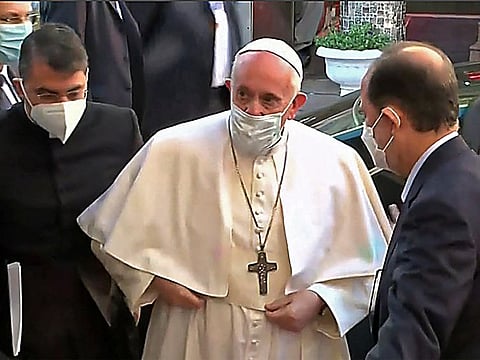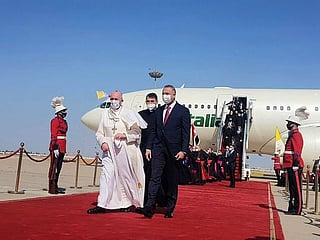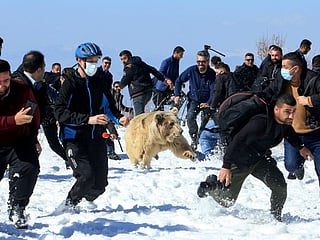Pope Francis in Iraq: Pope meets top Iraq Shiite cleric Grand Ayatollah Sistani
Ur, an ancient city, has a biblical connection as the believed birthplace of Abraham

Najaf: Iraq's Grand Ayatollah Ali Sistani, the top religious authority for most Shiite Muslims, hosted the head of the world's Catholics, Pope Francis, on Saturday in the shrine city of Najaf.
Sistani told Pope Francis in a landmark meeting in the holy city of Najaf Saturday that the country's Christians should live in "peace". Sistani "affirmed his concern that Christian citizens should live like all Iraqis in peace and security, and with their full constitutional rights," a statement from his office said.
Sistani, 90, almost never holds meetings but made an exception for 84-year-old Francis, who is making the first-ever papal trip to Iraq to encourage dwindling Christians and extend his hand to Shiite Muslims.
The historic meeting in Sistani's humble home was months in the making, with every detail painstakingly discussed and negotiated between the ayatollah's office and the Vatican.
When the time came, the 84-year-old pontiff's convoy, led by a bullet-proof vehicle, pull up along Najaf's narrow and column-lined Rasool Street, which culminates at the golden-domed Imam Ali Shrine, one of the most revered sites in the world for Shiites. He then walked the few meters (yards) to al-Sistani's modest home, which the cleric has rented for decades.
A group of Iraqis wearing traditional clothes welcomed him outside. As a masked Francis entered the doorway, a few white doves were released in a sign of peace.
Significant for Iraqi minorities
The closed-door meeting was to touch on issues plaguing Iraq's Christian minority. Sistani is a deeply revered figure in Shiite-majority Iraq and and his opinions on religious and other matters are sought by Shiites worldwide.
For Iraq's dwindling Christian minority, a show of solidarity from al-Sistani could help secure their place in Iraq after years of displacement _ and, they hope, ease intimidation from Shiite militiamen against their community.
The visit was being carried live on Iraqi television, and residents cheered the meeting of two respected faith leaders.
''We welcome the pope's visit to Iraq and especially to the holy city of Najaf and his meeting with Grand Ayatollah Ali Al-Sistani,'' said Najaf resident Haidar Al-Ilyawi. ``It is an historic visit and hope it will be good for Iraq and the Iraqi people.''
The Papal visit
Pope Francis embarked on the first-ever papal visit to Iraq on Friday and marked it with a call to end extremism and violence in his opening address to the country, long scarred by war and now gripped by the coronavirus.
The 84-year-old is defying a second wave of the global pandemic and renewed security fears to make a "long-awaited" trip to comfort one of the world's oldest Christian communities, while also deepening his dialogue with Muslims. The 4-day trip is historic and will include visits to significant cities in Iraq.
Vatican News shared the Pope's schedule for Saturday and he is set to visit two cities - Najaf and Ur. Due to depart from Baghdad at 7.45am [8.45am in UAE], the Pope's first event of the day is a visit to Grand Ayatollah Sayyid Ali al-Husayni al-Sistani in Najaf, described as one of the leading spiritual leaders of Iraq’s Shia Muslims.
He will then depart for Nassiryiaat at around 10.15am [11.15am in UAE], for an inter-religious meeting at the Plain of Ur shortly after 11am [noon in UAE]. The Pope will then return to Baghdad, where, at 6pm [7pm in UAE] he will celebrate mass at the Chaldean Cathedral of Saint Joseph.
Najaf
Both cities on today's schedule are historically, culturally and religiously significant. Najaf, the 1,230-year-old city that is the spiritual capital of most Shiites around the world.
Its imposing shrine - with a golden dome and intricate tiles inside - is the burial place of the Prophet Mohammed's son-in-law Ali, highly revered in Shiite Islam. In Najaf, Pope Francis will meet with Grand Ayatollah Ali Sistani, the top authority for most Shiite Muslims.
The 90-year-old cleric is never seen in public and rarely grants access to visitors, making the encounter one of the most extraordinary parts of the papal trip. The two will meet in Sistani's humble one-storey home, with most press barred from attending the sit-down.
Ur
Ur, thought to mean "town" in Sumerian, is believed to be where Abraham - the father of Judaism, Christianity and Islam - was born in the second millenium BCE. From Najaf, the Pope will travel to the desert location of Ur, which was founded in the fourth millennium before Christ, and became a major city in the ancient Sumero-Akkadian empire.
Its most important feature is its ziggurat, a staggered, pyramid-like structure that was excavated between the two world wars. The pope is set to hold an inter-religious event in Ur.






